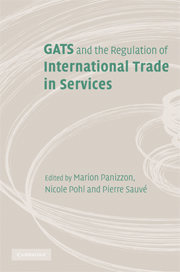Book contents
- Frontmatter
- Contents
- Contributors
- List of figures
- List of tables
- List of abbreviations
- Preface
- PART 1 Beyond regulatory control and multilateral flexibility: Gains from a cosmopolitan GATS
- PART 2 Unexplored economic, political and judicial dimensions of GATS
- PART 3 The limits of request–offer negotiations: Plurilateral and alternative approaches to services liberalisation
- PART 4 GATS case law: A first assessment
- PART 5 Market access, national treatment and domestic regulation
- PART 6 Unfinished business: Safeguard and subsidy disciplines for services
- PART 7 Challenges to the scope of GATS and cosmopolitan governance in services trade
- 22 Trade rules for the digital age
- 23 Comment: Digital trade: Technology versus legislators
- 24 How human rights violations nullify and impair GATS commitments
- 25 Comment: The instrumental rationale for protecting human rights in the context of trade services reform
- 26 In pursuit of the cosmopolitan vocation for trade: GATS and aviation services
- PART 8 Conclusion
- Index
- References
26 - In pursuit of the cosmopolitan vocation for trade: GATS and aviation services
from PART 7 - Challenges to the scope of GATS and cosmopolitan governance in services trade
Published online by Cambridge University Press: 03 September 2009
- Frontmatter
- Contents
- Contributors
- List of figures
- List of tables
- List of abbreviations
- Preface
- PART 1 Beyond regulatory control and multilateral flexibility: Gains from a cosmopolitan GATS
- PART 2 Unexplored economic, political and judicial dimensions of GATS
- PART 3 The limits of request–offer negotiations: Plurilateral and alternative approaches to services liberalisation
- PART 4 GATS case law: A first assessment
- PART 5 Market access, national treatment and domestic regulation
- PART 6 Unfinished business: Safeguard and subsidy disciplines for services
- PART 7 Challenges to the scope of GATS and cosmopolitan governance in services trade
- 22 Trade rules for the digital age
- 23 Comment: Digital trade: Technology versus legislators
- 24 How human rights violations nullify and impair GATS commitments
- 25 Comment: The instrumental rationale for protecting human rights in the context of trade services reform
- 26 In pursuit of the cosmopolitan vocation for trade: GATS and aviation services
- PART 8 Conclusion
- Index
- References
Summary
The large question we want to reconnoitre here is how to situate the purpose behind enhancing the trade regime, and trade in services in particular, within the range of other goals pursued by the international community. We ask this question at a time when the trade regime itself is experiencing an identity crisis, lacking in commitment to its institutional development and lacking a sufficiently compelling account of the purpose it is seeking to achieve. The question concerning its purpose nags away at the trade regime especially when it is being called to account for how it contributes to (or impedes) the advancement of the world's poorest countries, how it can be reconciled with the Marrakesh Agreement commitment to the objective of sustainable development, and how it relates to other overarching goals of international law. It is as if the trade regime is to the architecture of international law what a nondescript office tower is to architecture itself: it performs a purely economic function but is otherwise uninspiring and out of reach to the mass of people it looms over. Indeed, if trade law performs a purely economic function, the idea of moving the world toward further, ongoing economic integration, captured in the notion of progressive liberalisation, itself seems to have lost steam as doubts about the benefits of liberalised trade spread even to its erstwhile champions.
An example of this can be found in the recent debate between Paul Samuelson and his own students about the economic benefits of trade.
- Type
- Chapter
- Information
- GATS and the Regulation of International Trade in ServicesWorld Trade Forum, pp. 566 - 596Publisher: Cambridge University PressPrint publication year: 2008
References
- 2
- Cited by



